英语名词用法总结
- 格式:doc
- 大小:37.50 KB
- 文档页数:2
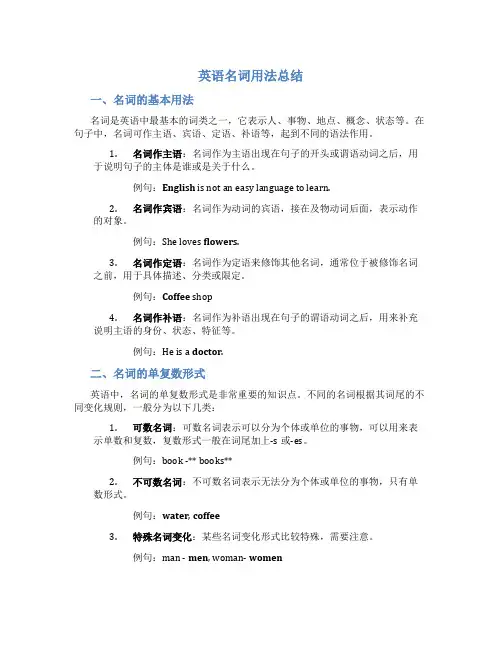
英语名词用法总结一、名词的基本用法名词是英语中最基本的词类之一,它表示人、事物、地点、概念、状态等。
在句子中,名词可作主语、宾语、定语、补语等,起到不同的语法作用。
1.名词作主语:名词作为主语出现在句子的开头或谓语动词之后,用于说明句子的主体是谁或是关于什么。
例句:English is not an easy language to learn.2.名词作宾语:名词作为动词的宾语,接在及物动词后面,表示动作的对象。
例句:She loves flowers.3.名词作定语:名词作为定语来修饰其他名词,通常位于被修饰名词之前,用于具体描述、分类或限定。
例句:Coffee shop4.名词作补语:名词作为补语出现在句子的谓语动词之后,用来补充说明主语的身份、状态、特征等。
例句:He is a doctor.二、名词的单复数形式英语中,名词的单复数形式是非常重要的知识点。
不同的名词根据其词尾的不同变化规则,一般分为以下几类:1.可数名词:可数名词表示可以分为个体或单位的事物,可以用来表示单数和复数,复数形式一般在词尾加上-s或-es。
例句:book -** books**2.不可数名词:不可数名词表示无法分为个体或单位的事物,只有单数形式。
例句:water, coffee3.特殊名词变化:某些名词变化形式比较特殊,需要注意。
例句:man - men, woman- women三、名词的所有格形式在英语中,名词的所有格形式表示所属关系。
一般在名词后面加上-apostrophe (‘)和 -s 表示单数所有格,或者在名词后面直接加上 -s 表示复数所有格。
例句:Tom’s book, the students’ books四、名词的前置修饰语名词可以被修饰,前置修饰语位于名词之前,用于进一步描述或限定名词。
常见的名词的前置修饰语包括:1.冠词:冠词包括定冠词(a, an)和不定冠词(the)。
例句:an apple, the book2.形容词:形容词用于描述名词的性质、特征等。
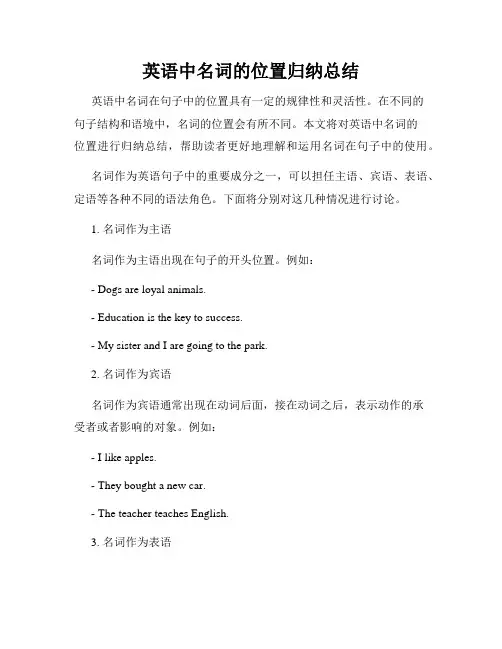
英语中名词的位置归纳总结英语中名词在句子中的位置具有一定的规律性和灵活性。
在不同的句子结构和语境中,名词的位置会有所不同。
本文将对英语中名词的位置进行归纳总结,帮助读者更好地理解和运用名词在句子中的使用。
名词作为英语句子中的重要成分之一,可以担任主语、宾语、表语、定语等各种不同的语法角色。
下面将分别对这几种情况进行讨论。
1. 名词作为主语名词作为主语出现在句子的开头位置。
例如:- Dogs are loyal animals.- Education is the key to success.- My sister and I are going to the park.2. 名词作为宾语名词作为宾语通常出现在动词后面,接在动词之后,表示动作的承受者或者影响的对象。
例如:- I like apples.- They bought a new car.- The teacher teaches English.3. 名词作为表语名词作为表语一般出现在系动词(be动词)之后,用于描述主语的性质、状态或身份等。
例如:- She is a doctor.- The movie was a success.- The weather today is sunny.4. 名词作为定语名词作为定语修饰其他名词时,出现在被修饰名词的前面,用于具体描述被修饰名词的特点、属性或类别等。
例如:- School bus- Coffee shop- Sports car5. 名词作为补语名词作为补语通常出现在及物动词或感官动词(如see, watch, hear 等)后面,用来补充说明主语的状态或感受等。
例如:- I found her asleep.- He felt the water cold.- We saw them happy.6. 名词在从句中的位置在从句中,名词的位置根据从句的语法结构来确定。
例如,在名词性从句中,名词可以作为主语、宾语或表语出现。
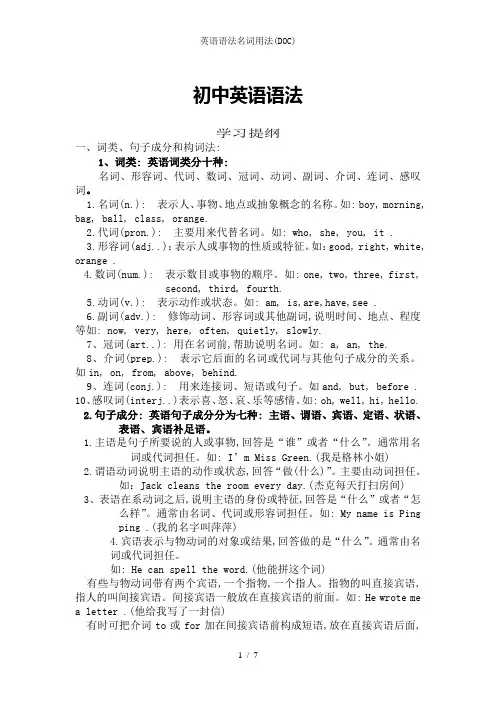
初中英语语法学习提纲一、词类、句子成分和构词法:1、词类: 英语词类分十种:名词、形容词、代词、数词、冠词、动词、副词、介词、连词、感叹词。
1.名词(n.): 表示人、事物、地点或抽象概念的名称。
如: boy, morning, bag, ball, class, orange.2.代词(pron.): 主要用来代替名词。
如: who, she, you, it .3.形容词(adj..):表示人或事物的性质或特征。
如:good, right, white, orange .4.数词(num.): 表示数目或事物的顺序。
如: one, two, three, first,second, third, fourth.5.动词(v.): 表示动作或状态。
如: am, is,are,have,see .6.副词(adv.): 修饰动词、形容词或其他副词,说明时间、地点、程度等如: now, very, here, often, quietly, slowly.7、冠词(art..): 用在名词前,帮助说明名词。
如: a, an, the.8、介词(prep.): 表示它后面的名词或代词与其他句子成分的关系。
如in, on, from, above, behind.9、连词(conj.): 用来连接词、短语或句子。
如and, but, before .10、感叹词(interj..)表示喜、怒、哀、乐等感情。
如: oh, well, hi, hello.2.句子成分: 英语句子成分分为七种: 主语、谓语、宾语、定语、状语、表语、宾语补足语。
1.主语是句子所要说的人或事物,回答是“谁”或者“什么”。
通常用名词或代词担任。
如: I’m Miss Green.(我是格林小姐)2.谓语动词说明主语的动作或状态,回答“做(什么)”。
主要由动词担任。
如:Jack cleans the room every day.(杰克每天打扫房间)3、表语在系动词之后,说明主语的身份或特征,回答是“什么”或者“怎么样”。
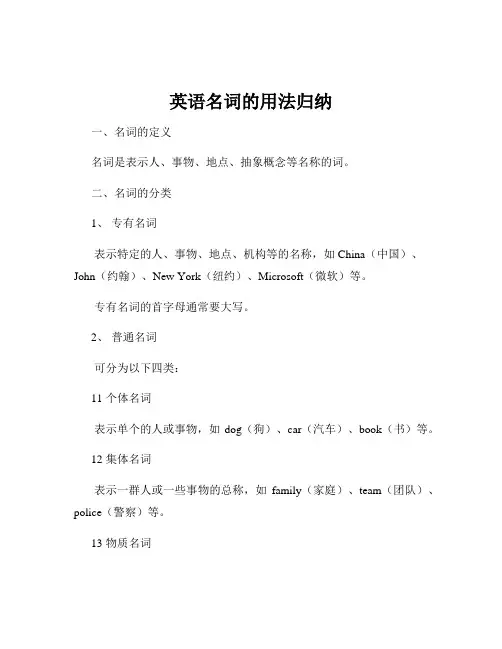
英语名词的用法归纳一、名词的定义名词是表示人、事物、地点、抽象概念等名称的词。
二、名词的分类1、专有名词表示特定的人、事物、地点、机构等的名称,如 China(中国)、John(约翰)、New York(纽约)、Microsoft(微软)等。
专有名词的首字母通常要大写。
2、普通名词可分为以下四类:11 个体名词表示单个的人或事物,如 dog(狗)、car(汽车)、book(书)等。
12 集体名词表示一群人或一些事物的总称,如family(家庭)、team(团队)、police(警察)等。
13 物质名词表示无法分为个体的物质或材料,如 water(水)、air(空气)、wood(木材)等。
14 抽象名词表示抽象的概念、性质、状态、情感等,如 love(爱)、happiness (幸福)、knowledge(知识)等。
三、名词的数1、可数名词有单数和复数形式。
单数名词表示一个,复数名词表示两个或两个以上。
复数形式的构成规则:11 一般在词尾加 s,如 book books,dog dogs。
12 以 s,x,ch,sh 结尾的名词,加 es,如 bus buses,box boxes,watch watches,dish dishes。
13 以“辅音字母+y”结尾的名词,变 y 为 i 再加 es,如 city cities,baby babies。
14 以 o 结尾的名词,有生命的加 es,无生命的加 s,如 tomato tomatoes,photo photos。
15 以 f 或 fe 结尾的名词,变 f 或 fe 为 v 再加 es,如 knife knives,leaf leaves。
不规则复数形式,如 man men,woman women,child children,foot feet,tooth teeth 等。
2、不可数名词没有复数形式。
表示物质或抽象概念的不可数名词,在表示数量时,要用“数词+表示量的名词+ of +不可数名词”的结构,如 a piece of paper(一张纸),a cup of coffee(一杯咖啡)。
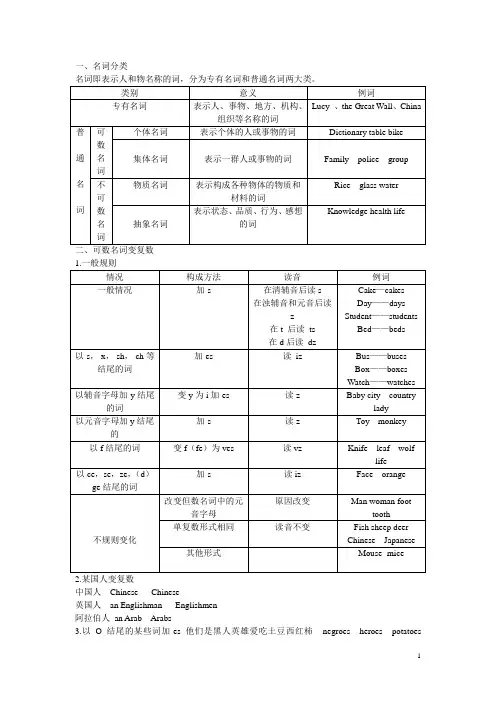
一、名词分类
二、可数名词变复数
2.某国人变复数
中国人Chinese Chinese
英国人an Englishman Englishmen
阿拉伯人an Arab Arabs
3.以O结尾的某些词加-es 他们是黑人英雄爱吃土豆西红柿negroes heroes potatoes
tomatoes
有些以O结尾的词加-s zoos radios
4.有些以f(ef)结尾的词直接加-s
chiefs gulfs Roofs beliefs proofs 首领站在港湾的房顶上相信证据
三不可数名词
A piece of cake a bottle of water a cup of tea
四、名词所有格
1.两种形式
‘s 和of 所有格
Eg:china’s capital the capital of china
2.and 连接的两个单数关系表示共有关系时,这时只在最后一个名词前加’s Eg:Lily and Lucy’s mother.
3.以s结尾的词直接在其后面加‘。
五、名词转化
1.某些名词后面加-y变成形容词sunny cloudy
2.在某些名词后加-ful useful careful。
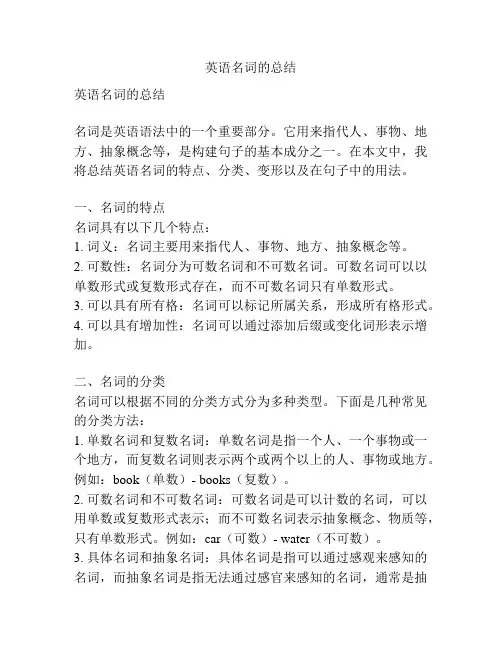
英语名词的总结英语名词的总结名词是英语语法中的一个重要部分。
它用来指代人、事物、地方、抽象概念等,是构建句子的基本成分之一。
在本文中,我将总结英语名词的特点、分类、变形以及在句子中的用法。
一、名词的特点名词具有以下几个特点:1. 词义:名词主要用来指代人、事物、地方、抽象概念等。
2. 可数性:名词分为可数名词和不可数名词。
可数名词可以以单数形式或复数形式存在,而不可数名词只有单数形式。
3. 可以具有所有格:名词可以标记所属关系,形成所有格形式。
4. 可以具有增加性:名词可以通过添加后缀或变化词形表示增加。
二、名词的分类名词可以根据不同的分类方式分为多种类型。
下面是几种常见的分类方法:1. 单数名词和复数名词:单数名词是指一个人、一个事物或一个地方,而复数名词则表示两个或两个以上的人、事物或地方。
例如:book(单数)- books(复数)。
2. 可数名词和不可数名词:可数名词是可以计数的名词,可以用单数或复数形式表示;而不可数名词表示抽象概念、物质等,只有单数形式。
例如:car(可数)- water(不可数)。
3. 具体名词和抽象名词:具体名词是指可以通过感观来感知的名词,而抽象名词是指无法通过感官来感知的名词,通常是抽象概念。
例如:cat(具体名词)- love(抽象名词)。
4. 物质名词和集合名词:物质名词表示物质的名称,例如:water(水)、gold(金);集合名词表示由相同类的人或物组成的群体,例如:team(团队)、family(家庭)。
5. 专有名词和普通名词:专有名词是指特定的人、事物、地方或组织的名称,通常以大写字母开头;普通名词则是一般性的名词,没有特定的指向。
例如:China(专有名词)- country (普通名词)。
三、名词的变形名词的变形主要包括单数变复数、增加后缀以及所有格形式的变化。
具体如下:1. 单数变复数:通常来说,英语名词的复数形式可以通过在词尾加上-s或-es来表示。
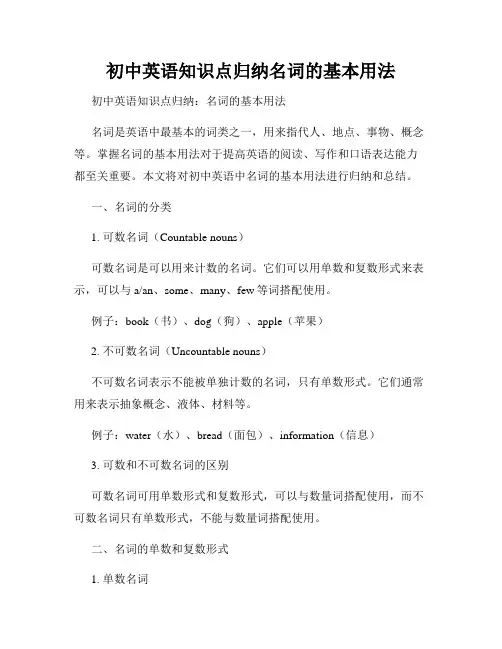
初中英语知识点归纳名词的基本用法初中英语知识点归纳:名词的基本用法名词是英语中最基本的词类之一,用来指代人、地点、事物、概念等。
掌握名词的基本用法对于提高英语的阅读、写作和口语表达能力都至关重要。
本文将对初中英语中名词的基本用法进行归纳和总结。
一、名词的分类1. 可数名词(Countable nouns)可数名词是可以用来计数的名词。
它们可以用单数和复数形式来表示,可以与a/an、some、many、few等词搭配使用。
例子:book(书)、dog(狗)、apple(苹果)2. 不可数名词(Uncountable nouns)不可数名词表示不能被单独计数的名词,只有单数形式。
它们通常用来表示抽象概念、液体、材料等。
例子:water(水)、bread(面包)、information(信息)3. 可数和不可数名词的区别可数名词可用单数形式和复数形式,可以与数量词搭配使用,而不可数名词只有单数形式,不能与数量词搭配使用。
二、名词的单数和复数形式1. 单数名词大部分名词在单数形式下使用,直接在名词后面加上s、es、ies等来构成复数形式。
- s 结尾的名词:直接在名词后面加s。
例子:books(书)、dogs(狗)- sh、ch、x、o 结尾的名词:在名词后面加es。
例子:bushes(灌木)、watches(手表)- 辅音字母 + y 结尾的名词:把y变为i,再加es。
例子:babies(婴儿)、cherries(樱桃)2. 不可数名词不可数名词没有复数形式,永远使用单数形式,不能与数量词搭配使用。
例子:water(水)、rice(米饭)、music(音乐)三、名词的所有格形式名词所有格用来表示所属或关系。
根据名词的单数和复数形式,可以加上'或's来构成名词所有格形式。
1. 单数名词在名词后面加上'。
例子:Tom's book(汤姆的书)2. 以s结尾的复数名词在名词后面加上'。
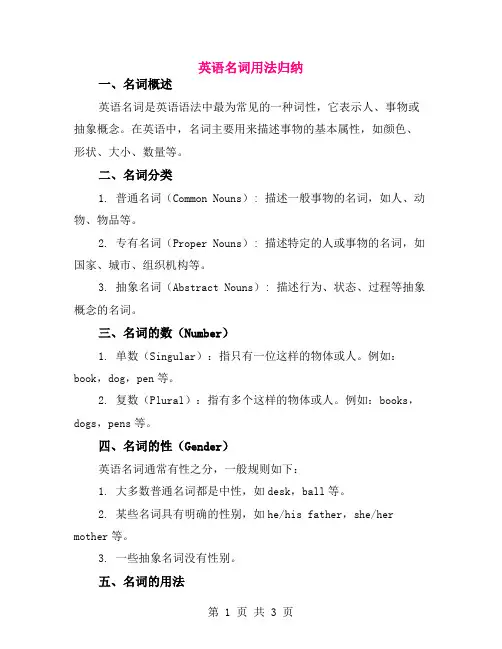
英语名词用法归纳一、名词概述英语名词是英语语法中最为常见的一种词性,它表示人、事物或抽象概念。
在英语中,名词主要用来描述事物的基本属性,如颜色、形状、大小、数量等。
二、名词分类1. 普通名词(Common Nouns): 描述一般事物的名词,如人、动物、物品等。
2. 专有名词(Proper Nouns): 描述特定的人或事物的名词,如国家、城市、组织机构等。
3. 抽象名词(Abstract Nouns): 描述行为、状态、过程等抽象概念的名词。
三、名词的数(Number)1. 单数(Singular):指只有一位这样的物体或人。
例如:book,dog,pen等。
2. 复数(Plural):指有多个这样的物体或人。
例如:books,dogs,pens等。
四、名词的性(Gender)英语名词通常有性之分,一般规则如下:1. 大多数普通名词都是中性,如desk,ball等。
2. 某些名词具有明确的性别,如he/his father,she/her mother等。
3. 一些抽象名词没有性别。
五、名词的用法1. 修饰名词的常见限定词包括形容词和限定词,如“a red book”,这里的“red”是形容词,“a”是限定词。
2. 代词可以用来代替名词,如“this is my book”,这里的“my book”可以被“it”代替。
3. 数词常用于表示数量或顺序,如“one book”,“first book”。
4. 同位语通常用来解释一个名词的具体内容,如“my sister, a teacher of English”,这里的“English”就是同位语。
5. 动词的第三人称形式常常与复数形式的名词连用,表示正在进行的动作或存在的状态,如“he reads a book every day”。
6. 复合名词(Compound Nouns)是由两个或更多的词组成的,它们通常通过连词符号“-”连接起来,如“playground”,“sandwich”等。
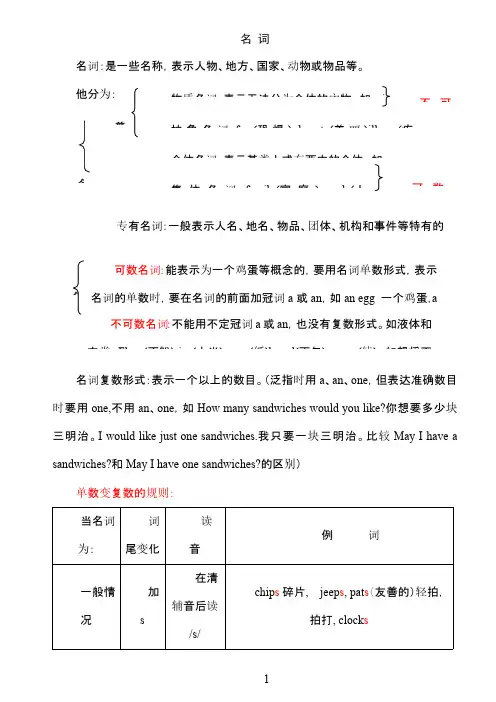
以说a person,a policeman,a head of cattle,the English,the British,the French,the Chinese,the Japanese,the Swiss 等名词,表示国民总称时,作复数用。
如:The Chinese are industries and brave. 中国人民是勤劳勇敢的。
4、以s结尾,仍为单数的名词,如:a). maths,politics,physics等学科名词,为不可数名词,是单数。
b). news 是不可数名词“新闻”。
c). the United States,the United Nations 应视为单数。
The United Nations was organized in 1945. 联合国是1945年组建起来的。
d). 以复数形式出现的书名,剧名,报纸,杂志名,也可视为单数。
"The Arabian Nights" is a very interesting story-book..<<一千零一夜>>是一本非常有趣故事书。
5、没有单数形式的名词:表示由两部分构成的东西glasses眼镜shorts短裤trousers裤子scissors剪刀若表达具体数目,要借助数量词pair(对,双); suit(套); a pair of glasses; two pairs of trousers,His trousers are there 他的裤子在那里6、另外还有一些名词,其复数形式有时可表示特别意思,如:goods货物,waters水域,fishes(各种)鱼,room为可数名词时为“房间”,如:I live in Room 5.而room为抽象名词时为空间上面一句话应译为“请给老妇人在校车上留个地方。
”这样的词还有:glass 玻璃glasses 眼镜stone 石头a stone 一块石头time 时间twotimes 两次wood 木头woods 树林。
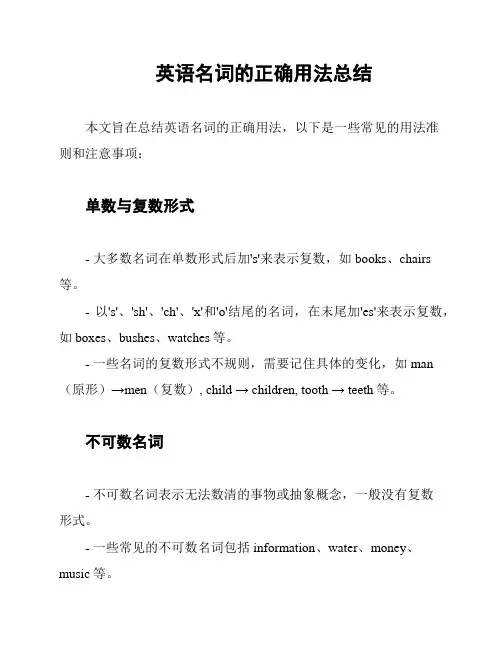
英语名词的正确用法总结本文旨在总结英语名词的正确用法,以下是一些常见的用法准则和注意事项:单数与复数形式- 大多数名词在单数形式后加's'来表示复数,如books、chairs 等。
- 以's'、'sh'、'ch'、'x'和'o'结尾的名词,在末尾加'es'来表示复数,如boxes、bushes、watches等。
- 一些名词的复数形式不规则,需要记住具体的变化,如man (原形)→men(复数), child → children, tooth → teeth等。
不可数名词- 不可数名词表示无法数清的事物或抽象概念,一般没有复数形式。
- 一些常见的不可数名词包括information、water、money、music等。
可数名词和不可数名词的量词- 可数名词表示可数清的事物,可以和数量词连用,如a book (一本书)、two chairs(两把椅子)等。
- 不可数名词一般不能和数量词连用,但可以使用单位词来表示具体数量,如a glass of water(一杯水)、a bag of rice(一袋米)等。
名词所有格- 名词所有格用于表示所属关系或归属关系,通常在名词后面加上撇号和's',如my mother's car(我妈妈的车)。
- 对于以's'结尾的复数名词,只需在名词后加上撇号,如the students' books(学生们的书)。
名词作为修饰语- 名词可以用来修饰其他名词,形成名词短语,如car park(停车场)、coffee table(咖啡桌)等。
- 修饰名词的名词通常以单数形式出现。
以上是英语名词的一些常见用法总结,希望对您有所帮助。
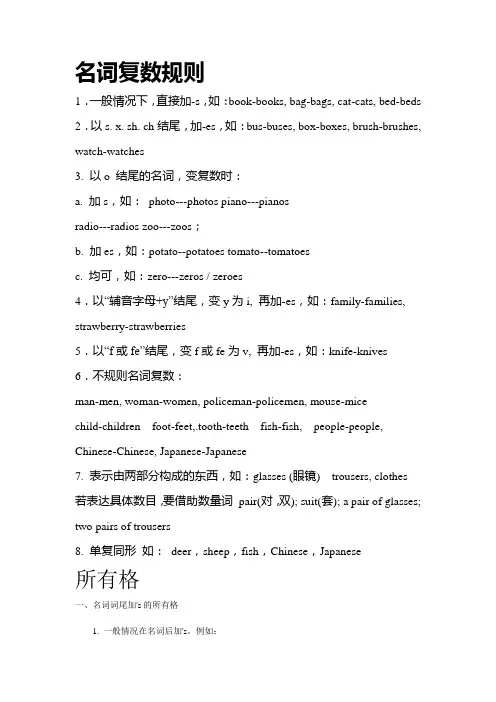
名词复数规则1.一般情况下,直接加-s,如:book-books, bag-bags, cat-cats, bed-beds 2.以s. x. sh. ch结尾,加-es,如:bus-buses, box-boxes, brush-brushes, watch-watches3. 以o 结尾的名词,变复数时:a. 加s,如:photo---photos piano---pianosradio---radios zoo---zoos;b. 加es,如:potato--potatoes tomato--tomatoesc. 均可,如:zero---zeros / zeroes4.以“辅音字母+y”结尾,变y为i, 再加-es,如:family-families, strawberry-strawberries5.以“f或fe”结尾,变f或fe为v, 再加-es,如:knife-knives 6.不规则名词复数:man-men, woman-women, policeman-policemen, mouse-micechild-children foot-feet,.tooth-teeth fish-fish, people-people, Chinese-Chinese, Japanese-Japanese7. 表示由两部分构成的东西,如:glasses (眼镜) trousers, clothes若表达具体数目,要借助数量词pair(对,双); suit(套); a pair of glasses; two pairs of trousers8. 单复同形如:deer,sheep,fish,Chinese,Japanese所有格一、名词词尾加's的所有格1. 一般情况在名词后加's。
例如:That girl's coat is in the room. 那个女孩的衣服在房间里。
名词用法知识点名词是英语语法中的一个重要部分,它用来表示人、物、地点、抽象概念等。
掌握名词的正确用法对于提升英语水平至关重要。
本文将介绍名词的用法知识点,包括单数和复数形式、可数和不可数名词、名词所有格和名词作为主语、宾语和表语的用法。
1. 单数和复数形式名词有单数和复数两种形式。
通常,名词在表示一个物体或概念时使用单数形式,而表示多个时则使用复数形式。
例如,“cat”(猫)是单数形式,“cats”(猫们)是复数形式。
有些名词的复数形式需要在词末加上“-es”,如“boxes”(盒子们),而有些名词的复数形式则在词尾直接加“-s”,如“dogs”(狗们)。
2. 可数和不可数名词名词可以分为可数和不可数两类。
可数名词指的是可以用数字进行计数的名词,如“book”(书)、“cat”(猫)。
在表示单个物体时,可数名词使用单数形式,而表示多个物体时,使用复数形式。
不可数名词则指的是无法计数的名词,如“water”(水)、“love”(爱)。
不可数名词通常没有复数形式,如果需要表示数量,可以使用量词来修饰,如“a bottle of water”(一瓶水)。
3. 名词所有格名词所有格用来表示所属关系。
对于可数名词,一般在名词的末尾加上“-'s”来表示所有格,如“John's book”(约翰的书)。
对于以“-s”结尾的复数名词,只需要在末尾加上一个撇号(')即可,如“the students' books”(学生们的书)。
不可数名词的所有格则在名词前加上“of”,如“the beauty of nature”(自然的美)。
4. 名词作为主语、宾语和表语的用法名词可以在句子中担任主语、宾语和表语的角色。
作为主语时,名词通常置于句子的开头,如“Computers are useful.”(电脑很有用)。
作为宾语时,名词通常置于动词或介词之后,如“I like dogs.”(我喜欢狗)。
英语名词用法大全名 词名词:是一些名称,表示人物、地方、国家、动物或物品等。
他分为:不用an 、one ,如How many sandwiches would you like?你想要多少块三明治。
I would like just one sandwiches.我只要一块三明治。
比较May I have a sandwiches?和May I have one sandwiches?的区别)单数变复数的规则: 当名词为: 词尾变化读 音 例 词一般情况加s 在清辅音后读/s/chip s 碎片, jeep s , pat s (友善的)轻拍,拍打, clock s在浊辅音或元音后读/z/boy s , sharpener s 磨床,磨器,磨具, sofa s (长)沙发, drawer s 抽屉 普通专有名词:一般表示人名、地名、物品、团体、物质名词:表示无法分为个体的实物,如:抽象名词fear(恐惧) beauty(美个体名词:表示某类人或东西中的个集体名词family(家名可数名词:能表示为一个鸡蛋等概念的,要用名词单数形式,表示名词的单数时,要在名词的前不可数名词:不能用不定冠词a 或an ,也没有复数形式。
如液体和肉类。
Flour(面粉)rice(大名可数名不可数在t后面读/ts/student-student s在d后面读/dz/bed-bed s以s, z,x,ch ,sh结尾的单词加es /iz/watch es, box es, class es,brush es, bus es, fox es,branch es树枝, match es火柴,bush es灌木丛, brush es刷子,quiz es小测验,不规则ox牛-oxen,stomach胃-stomachs,bamboo竹子-bamboos piano钢琴-pianos,photo相片-photos,studio录音室-studios,zoo动物园-zoos只加s以字母o结尾的单词多数加s,“元音字母+o”结尾的词,一概加-s/z/,zoo s, photo s, bamboo s竹子, radio-radio s,curio s小件珍奇物品,rodeo s, tattoo s文身;刺青以字母o结尾的单词少数以o结尾的词后需加-es /z/tomato es蕃茄, potato es,hero es, mango s(或mango es)芒果,zero---zero s或zero es,Negro-Negro es黑人.注:加es的有:黑人英雄爱吃土豆西红柿echo模仿-echo es;embargo贸易禁运令; 禁运-embargo es;jingo沙文主义者-jingo es;torpedo鱼雷-torpedo es,veto否决权-veto es,mosquito蚊子-mosquito es,go精力-go es;no拒绝-no es;motto格言-motto es.加-s或-es 均可/z/zero零-zero s(zero es),halo(图画中圣人头上的)光环,灵光-halo s(halo es),mango芒果-mangos(mangoes),motto格言,tornado龙卷风; 旋风;volcano火山;cargo(船或飞机装载的)货物;buffalo水牛;commando突击队员以辅音字母+y 结尾的单词去y变i加es/z/dictionar ies,strawberr ies, baby婴儿-bab ies, story故事-stor ies,lady女士-lad ies,body身体-bod ies ,city城市-cit ies,fly苍蝇-fl ies,country国家-countr ies party聚会-part ies,元音字母(a、e、i、o、u)+y结尾或以y结尾的专有名词在y后面加s/z/boy男孩-boy s,day日子-day s,key钥匙-key s,toy玩具-toy s way方法-way s,donkey驴子-donkey s,monkey猴子-monkey stwo Mary s theHenry s亨利,storey层楼-storey s,gulf海湾,(地面的)裂口,深坑-gulf s以f 或fe结尾的单词多数直接加-scliff悬崖-cliff s,proof证据-proof s,safe保险柜-safe s,roof屋顶-roof s,chef厨师-chef s,belief信念-belief s, chief首领-chief s, reef礁-reef s,cuff袖口-cuff s,fife横笛-fife s,gulf 海湾-gulf s,strife争吵-strife s去f或fe变v加es/vz/knife刀-kni ves,leaf树叶-lea ves,half一半-hal ves,life生命-li ves,shelf架子-shel ves,wolf狼-wol ves,wife妻子-wi ves,handkerchief手帕; 纸巾-handkerchief s或handkerchie ves, elf小妖精-elv es,calf腿肚子-calv es,thief小偷-thiev es,loaf一条[块]面包-loa ves, self自我-sel ves以th结尾的词加s/ðz/;/θz/mouth s, path s; month s,death s个别名词,可加-s或-es hoof蹄-hoofs(hooves),wharf码头-wharfs(wharves),scarf围巾-scarfs(scarves),dwarf 矮子-dwarfs(dwarves)beef 牛肉-beefs(beeves),staff管理人员-staffs(staves)字母、数字、引语或缩略(词)语的复数形式是在其后加’s或-s 1、There are two f’s in the word “office”.单词office中有2个f 2、Many VIPS are coming to our city.许多重要人物将到我们市来1、单数和复数形式相同的名词Chinese中国人,sheep羊,deer鹿,fish鱼, Japanese日本人,li,jin,yuan,two li,three mu,four jin,但除人民币元、角、分外,美元、英镑、法郎等都有复数形式。
一、英语中各种词性的用法及解释1.名词名词可以分为专有名词(Proper Nouns)和普通名词(Common Nouns)。
专有名词是某个(些)人,地方,机构等专有的名称,如Beijing,China等。
(不是专有名词就是普通名词)(1)名词变复数的方法1)规则的变复数的方法2)不规则变化情况①以o 结尾的名词,变复数时:a. 加s,如:photo---photos piano---pianos radio---radioszoo---zoos;b. 加es,如:potato—potatoes tomato—tomatoes(基本规律:有生命性质的词在后面加es,否则加s)②以f或fe 结尾的名词变复数时:a. 加s,如:belief---beliefs roof---roofs safe---safesgulf---gulfs;b. 去f, fe 加-ves,如:half---halves knife---knives leaf---leaveswolf---wolves wife---wives life---lives thief---thieves;③名词复数的不规则变化child---children foot---feet tooth---teeth mouse---mice man---menwoman---women④单复同形如:deer,sheep,fish,Chinese,Japanese集体名词,以单数形式出现,但实为复数。
如:people police cattle 等本身就是复数,不能说a people,a police,acattle,但可以说a person,a policeman,a head of cattle, the English,theBritish,the French,the Chinese,the Japanese,the Swiss 等名词,表示国民总称时,作复数用。
25个英语名词的用法25个英语集合名词的用法导语:英语中有很多集合名词,下面YJBYS店铺举例详解25个集合名词的用法,欢迎参考。
1. army的用法army是一个可数的集合名词,意思是“陆军”“大群”“大批”等。
注意以下用法:(1) 表示军队或陆军,其前通常用定冠词;若与不定冠词或数词连用,则表示一支或几支军队。
如:When I grow up, I’m joining the army. 我长大了要参军。
It was said that it was a modern army. 据说那是一支现代化的军队。
The two armies fought for control of the bridge. 两军为占领那座桥而战。
(2) army作主语时,谓语动词可用单数(视为整体)或复数(侧重个体)。
如:The army was [were] called out to enforce the curfew. 军队被派去强制执行宵禁。
(3) 用于an army of表示“一群……”时,其后通常接可数名词的复数形式;这类结构若用作主语,谓语动词可用单数(视为整体)或复数(侧重个体)。
如:An army of bees were flying around. 一大群蜜蜂到处飞着。
An army of workmen was brought in to build the stadium. 一大批工人被召来修建运动场。
但是,若用armies of…作主语,则谓语动词要用复数。
如:Armies of rescue workers are sorting through the rubble. 救援大军正在碎石中搜寻。
2. audience的用法(1) audience的意思是“观众”“听众”,用作主语时,其谓语可用单数(视为整体)或复数(视为个体)。
如:The audience was made up of very young children. 观众都是很小的孩子们。
英语名词用法详解1. 可数名词和不可数名词在英语中,名词可以分为可数名词和不可数名词两种类型。
可数名词 (Countable Nouns)可数名词指的是可以用数字进行计数的名词。
例如:book (书)、dog(狗)、car(车)等。
可数名词可以单数和复数形式存在,可以与冠词(a/an/the)和数词(one, two, etc.)连用。
例句:- I have two dogs.- She bought a book.不可数名词 (Uncountable Nouns)不可数名词指的是不能用数字进行计数的名词,也不能直接加s变为复数形式。
例如:water(水)、information(信息)、money(钱)等。
不可数名词不能与冠词(a/an)连用,也不能与数词直接连用。
例句:- Can I have some water?- He gave me some information.2. 可数名词的单复数形式变化规则可数名词的复数形式通常通过在词尾加上-s或-es来表示。
然而,并不是所有可数名词的复数都遵循这个规则,一些名词会发生拼写变化,这需要通过研究和记忆来掌握。
- 表示复数的常见规则:在名词的末尾加-s。
例如:books (书)、chairs(椅子)等。
- 前提条件:名词是可数名词,并且不属于下面的特殊情况之一。
特殊情况:1. 名词以s、sh、ch、x、o结尾时,在词尾加-es。
例如:boxes (盒子)、watches(手表)。
2. 以辅音字母+y结尾的名词,将y变为i,再加-es。
例如:babies(婴儿)、countries(国家)。
3. 以辅音字母+o结尾的名词,通常在词尾加-es。
例如:potatoes(土豆)、tomatoes(西红柿)。
4. 以f或fe结尾的名词,通常将f或fe变为v,再加-es。
例如:leaves(树叶)、wives(妻子)。
3. 不可数名词的用法不可数名词通常用单数形式来表示,它们不能直接加s变为复数形式。
If you want to live an ordinary life, you will encounter ordinary setbacks.简单易用轻享办公(页眉可删)英语名词用法大全名词:是一些名称,表示人物、地方、国家、动物或物品等。
不用an、one,如Howmanysandwicheswouldyoulike?你想要多少块三明治。
Iwouldlikejustonesandwiches.我只要一块三明治。
比较MayIhaveasandwiches?和MayIhaveonesandwiches?的区别)单数变复数的规则:1、Chinese中国人,sheep羊,deer鹿,fish鱼,Japanese 日本人,li,jin,yuan,twoli,threemu,fourjin,但除人民币元、角、分外,美元、英镑、法郎等都有复数形式。
如:adollar,twodollars;ameter,twometers2、不规则的名词foot脚-feetmouse老鼠-micechild小孩-childgoose鹅-geeseman男人-menwoman女人-womentooth牙-teeth,注意:与man和woman构成的合成词,其复数形式也是-men和-women。
如:anEnglishman,twoEnglishmen.但German不是合成词,故复数形式为Germans;3、集体名词,以单数形式出现,但实为复数。
如:peoplepolicecattle等本身就是复数,不能说apeople,apolice,acattle,但可以说aperson,apoliceman,aheadofcattle,theEnglish,theBritish,theFrench,theChinese,theJapanese,theSwiss等名词,表示国民总称时,作复数用。
如:TheChineseareindustriesandbrave.中国人民是勤劳勇敢的。
名词
考点:
1.掌握可数名词的复数
2.学会表示不可数名词的量
3.掌握构词法:名词变形容词
4.掌握名词所有格的用法
5.掌握名词做主语、定语的用法
冠词离开名词没有任何意义,因此在学习冠词前,首先要了解名词的分类:
个体名词:人或物所共用的名称dog, chair
名词可分为:可数名词
集体名词:集体的名称class, family, police,
物质名词:物质的名称paper, water
不可数名词抽象名词:抽象的物的名称happiness
专有名词:人或物所特有的名称Tom, China
考点一:可数名词的数
可数名词复数变化规则:
(1)规则变化:a. 以-s,-x,-sh, -ch,结尾的名词,在词尾+es, 发音/-Is/ eg:classes, brushes, boxes, watches
b. 以辅音字母+ -y结尾,将y变i,再+es,eg:parties, stories(注意元音同y结尾时+s boys)
c.部分以f或fe结尾的词,将变f/fe为v+es,eg:wife-wives
口诀:(妻见小偷加下藏,手拿小刀想杀狼,忽然飘下一片叶,砸在头上一命亡)
d.部分以o结尾的词,(生物名词,包括动植物,口诀:黑人英雄爱吃土豆西红柿)后加es,
如:Negroes, heroes, potatoes, tomatoes,
以o结尾的无生命的词,一般直接+s eg:photos,pianos,kilos,tobaccos
(2)不规则变化:a. 名词中所含元音字母发生变化eg: foot-feet; tooth- teeth; man- men; woman- women;
b: 名词词尾加en/ren:ox-oxen;child-children;
c. 单复数同行:fish; sheep; deer; means; aircraft;
d. 关于国家: 中日不变,英法荷变,其他后面加s
two Chinese; five Japanese;/ Englishmen; Englishwomen; Dutchmen; /Germans; Americans
e. 有些集体名词用单数形式表达事物总称,如hair, fruit, 但在表示“几根头发”,“若
干水果”时,则用复数形式 a few white hairs; several foreign fruits
f. 有些名词形式上是单数的,但实际上是复数的,这一类名词有:cattle牛,家畜;people
人们;vermin害虫;police警察;staff全体职员; clergy僧侣,神职人员;youth;
mankind;bacteria;crew等
g. 有些集体名词表示整体时用单数,表示集体中的各个成员时用做复数,能这样用的集
体名词有:audience,club,class,college,crowd,company,couple,department,
enemy,family,firm,flock, generation, government, group, herd, navy, party, public,
population, press新闻界/记者群,staff, team, university等
(3) 复合名词的复数a. 由man或woman为前缀的复合名词,两者都变成复数
a man teacher/ men teachers;a woman doctor/ women doctors
b. 以两个名词构成的复合名词,除man/woman外,一般将后面的名词变为复数
boy friend/ boy friends; paper bag/ paper bags
c. 以’可数名词+介词’ (即有主体名词)构成的复合名词,将前面的名词变为复数形式
passer-by/ passes- by; father-in-law/ fathers-in-law
d. 以“动词/过去分词+副词”(即无主体名词)构成的符合名词变成复数,在词尾+s
grown-up/ grown-ups; stand-by/stand-bys; go-between/ go-betweens中间人
注意:有一些名词,包括学科名词,形式上为复数,但意义上却是单数,如:news消息;mathematics数学(4)除可数名词外的其它复数形式:a. 年份后加-s或-‘s,如:the VIPs或VIP’s
考点二:不可数名词的数
(1)不可数名词就是指无法分清个体的名词,这类词主要为抽象名词和物质名词。
表示不可数名词的量时,用“数词或冠词+数量名词+of+不可数名词”,数量名词可以是单数或复数,但of后的名词只用单数,如:a piece of paper; two cups of tea; three items of news
(2)有些物质名词可用复数形式,表示“一份”、”一杯”、”一种”等,数量或不同的类别,如:two coffees, please;a salad一盘沙拉;a strawberry ice cream一份草莓冰淇淋;fruits各种水果;teas各种茶;steels 各种钢;wools各种羊毛
(3) 有些抽象名词可以用单数或复数形式表示具体的事物。
如:difficulty困难-difficulties难事success成功-a success 一个成功的人或一件成功的事
(4) 有个别的物质名词表示不同类别或连绵不断的数量或密度时,可用复数形式。
如:sands沙滩waters大片的水
(5) 有些不可数名词,特别是表示自然现象的名词,常可以和不定冠词,形容词连用,表示单数概念,如:
a strong wind一场大风;a heavy snow一场大雪;a heavy rain一场大雨;a good light一道亮光;。